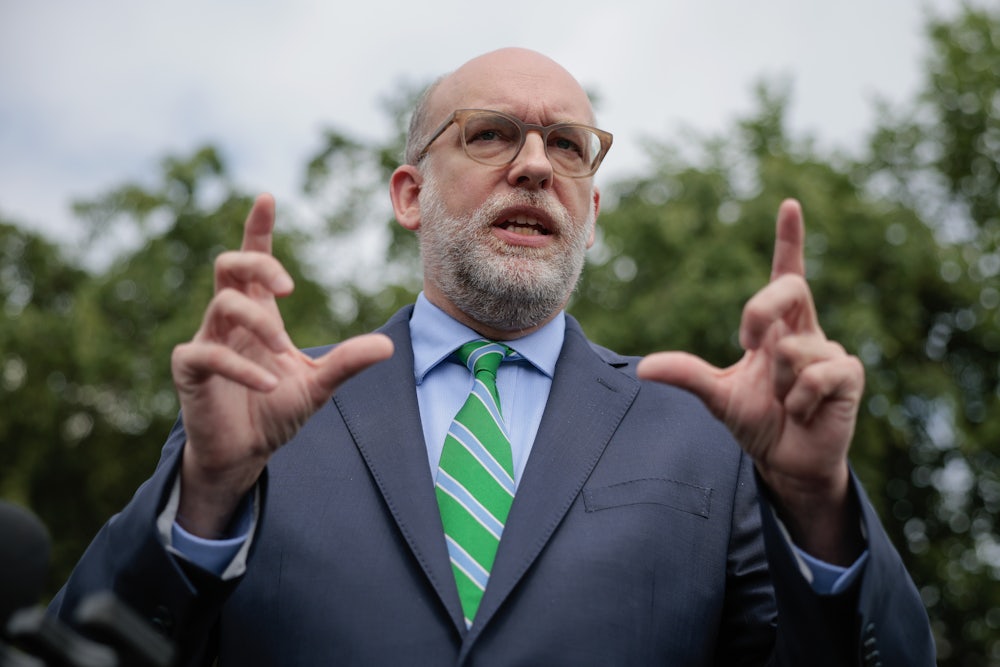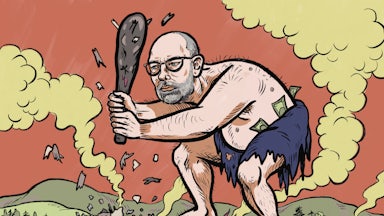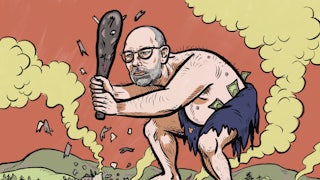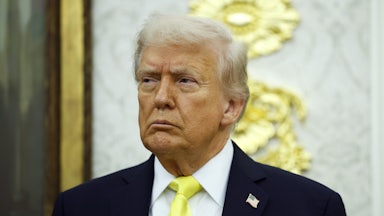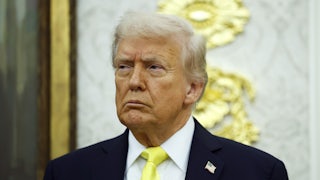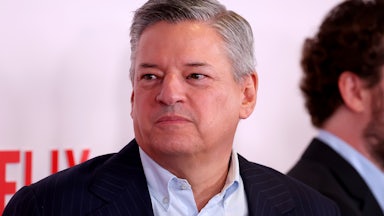Elon Musk may have “left Washington” last week, but the Department of Government Efficiency won’t miss a step. That’s because Musk was never running DOGE in the first place. I’m not suggesting that Amy Gleason was in charge. Gleason, you may recall, is the government official whom the White House last February named as a sort of papier-mâché acting DOGE administrator as part of its legal sleight of hand to shield Musk from litigation. Gleason is a data expert who worked for Musk, not the other way around. No, I’m talking about Office of Management and Budget Director Russell Vought.
The worst-kept secret in Washington is that Vought, from day one, was pulling Musk’s marionette strings at DOGE. That lends some irony to news reports that Vought will inherit Musk’s DOGE portfolio. In truth, that portfolio has been sitting atop Vought’s desk since January. “Elon Musk is the face of DOGE,” said Bloomberg Businessweek last month, “but Russell Vought is the brains.”
Am I saying Musk brought nothing to the table? I am not. Assembling and deploying DOGE’s team of tech saboteurs—those hoodied 24-year-olds who tapped into government computer systems that were theoretically off-limits to them—was Musk’s chief contribution. The wildly inaccurate DOGE scorecard of savings achieved looks like Musk’s handiwork too. And it goes without saying that Musk enlivened the project with hateful rhetoric. I won’t soon forget this tweet (which Musk took down after it caused an uproar): “Stalin, Mao, and Hitler didn’t murder millions of people. Their public sector employees did.”
But when Musk took on this project, he knew nothing about how the federal government works and therefore would have been incapable of choosing DOGE’s targets. Also, it’s doubtful Musk had the first clue how to get around the obstacles that civil servants threw in his path.
Then there’s the matter of Musk’s pill-popping and severely disordered personal life while campaigning for candidate Donald Trump last fall, as documented last week by The New York Times. According to the Times’ Kirsten Grind and Meghan Twohey, Musk was “using drugs far more intensely than previously known.” These drugs included ecstasy, magic mushrooms, and so much ketamine that the richest man in the world struggled to maintain bladder control.
Per Grind and Twohey, it’s “unclear” whether Musk continued doing all this in the White House. But I wouldn’t call it very unclear. Grind and Twohey note that Musk’s behavior while in government was “erratic … insulting cabinet members, gesturing like a Nazi and garbling his answers in a staged interview.” (Grind and Twohey wrote that before Musk showed up Friday in the Oval Office with a shiner.) We know from a January 2024 Wall Street Journal report by Grind and Emily Glazer that executives and board members at Musk’s companies have for some time been worrying a great deal about Musk’s consumption of these same drugs (and also LSD).
Vought, on the other hand, is by all accounts extremely knowledgeable about how the government works, having previously worked as OMB director during Trump’s first term, assuming the role in 2019 after his predecessor, Mick Mulvaney, became acting chief of staff. Before that, Vought was (among other things) executive director of the Republican Study Committee and policy director of the House Republican Conference. “There’s a category of conservative activists who say, ‘This is what should be done,’” Tom Fitton, president of the conservative nonprofit Judicial Watch, told McKay Coppins of The Atlantic last month, “and there’s a much smaller group who actually know how to make it happen. Russ is one of them.”
DOGE was carved out of an existing (and far more anodyne) White House office, the United States Digital Service, which is part of … you guessed it—OMB. According to The New York Times, Trump moved DOGE out of OMB to put it out of the reach of “open records laws that could give the public insight into its operations.” It would not surprise me to learn that this was Vought’s idea.
Vought is also Mister Project 2025. He wrote the chapter in this notorious Heritage Foundation book about White House powers over the executive branch, having previously served seven years as vice president of Heritage’s political advocacy arm, Heritage Action. According to David Graham’s new book The Project: How Project 2025 Is Reshaping America, Vought is “widely understood to be the driving intellectual force behind the project.” Trump disavowed Project 2025 during the 2024 campaign (“I don’t know anything about it, I don’t want to know anything about it”), but Vought’s involvement alone is sufficient to call Trump a liar: Trump installed Vought as policy director of the platform committee at the Republican National Convention.
Since January, Project 2025 has been (to the extent anything is) the Trump White House’s blueprint for policymaking. A Project 2025 tracker maintained jointly by two nonprofits, the Center for Progressive Reform and Governing for Impact, checks off 31 recommendations just at OMB, which lies (per Graham) “at the heart of Project 2025’s plan to remake the government.” A somewhat more user-friendly Project 2025 tracker created by two tech nerds on Reddit follows 313 policy recommendations from the volume. Of these, it reports, 98 are done and 66 are “in progress.”
One of Project 2025’s major aims is to radically downsize the federal government. “The overall situation is constitutionally dire,” Vought wrote in it, “unsustainably expensive, and in urgent need of repair.” In a subsequent interview with Tucker Carlson, Vought said OMB “has the ability to turn off the spending that is going on at the agencies.” Not DOGE; OMB.
In a February memo to the heads of executive branch departments and agencies, Vought and Charles Ezell, acting administrator for the White House Office of Personnel Management, called for “the maximum elimination of functions that are not statutorily mandated” and explained how the layoff process in the federal government worked, imposing at least some semblance of order on Musk’s mass firings. It was also Vought who expanded DOGE’s budget during Trump’s first weeks in office from an initial $750,000 to $14 million.
Here’s how Politico’s Megan Messerly, citing four former Trump officials, explained the working relationship between Musk and Vought:
Musk … provides the public face to the bureaucracy-slashing efforts and takes the heat for the budget-cratering, employee-firing and overall havoc-wreaking that has been unleashed on the federal government. Vought … brings the expertise, insider knowledge and ideology.… Musk’s army makes very public incursions into agencies and ferrets through data using artificial intelligence … to identify allegedly wasteful spending while Musk handles the public relations campaign on X and amplifies their findings. Vought’s OMB, meanwhile, brings the technical tools and expertise to figure out, one, whether the concerns DOGE raises are actually problems and two, what to do with them.
If Vought was pulling the marionette strings, why did so many of DOGE’s actions get overturned by federal courts? The Institute of Peace, for instance, reclaimed its headquarters in late May after DOGE tried to expel it, and even without judicial intervention, 70 Agriculture Department leases that DOGE tried to cancel got un-canceled. Wouldn’t a longtime Washington pro know how to be more surgical in cutting government and avoid such reversals?
Not if that Washington pro didn’t care. Like Steve Bannon and other hard-core Trump believers, Vought is a fanatical advocate for maximum disruption. “We are living in a post-constitutional time,” Vought has written, meaning that our current constitutional norms are so polluted by mainstream legal thinking over the past 100 years that we need to tear them down. In effect, Vought wants to repeal—not the industrial revolution, exactly, but certainly the governmental structures created to keep it from overpowering democratic governance. Firings are integral to this goal; so is demoralization. As Molly Redden, Andy Kroll, and Nick Surgey reported last October for Pro Publica, Vought was recorded saying in a private meeting:
We want the bureaucrats to be traumatically affected. When they wake up in the morning, we want them to not want to go to work because they are increasingly viewed as the villains. We want their funding to be shut down so that the EPA can’t do all of the rules against our energy industry because they have no bandwidth financially to do so.
We want to put them in trauma.
Mission accomplished. DOGE hasn’t done much to reduce the budget deficit; indeed, according to CNN analyst Zachary B. Wolf, DOGE could easily end up netting out as a loss to the Treasury of about $45 billion. But if Vought were serious about eliminating red ink, he wouldn’t be working so hard to pass a Big, Beautiful reconciliation bill that will more than double the budget deficit.
Musk pointed out the folly of the reconciliation bill on his way out the door. That was reported as Musk criticizing Trump, but more notably it was Musk slighting Vought. Pinocchio was giving Geppetto a little back talk. Vought took it in stride because his goal is demolition, not solvency, and (setting aside adverse judicial rulings that the administration may or may not obey) the wrecking ball continues to swing. Vought didn’t even bother to fold all of DOGE’s cuts into the administration’s proposed budget, he said last weekend on CNN, because he didn’t think he had to. But isn’t that impoundment, CNN’s Dana Bash asked Vought. “We are not in love with the law,” Vought replied. DOGE isn’t going anywhere.
